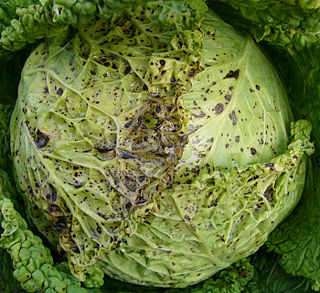A satellite is a subviral agent that depends on the coinfection of a host cell with a helper virus for its replication. Satellites can be divided into two major classes: satellite viruses and satellite nucleic acids. Satellite viruses, which are most commonly associated with plants, but are also found in mammals, arthropods, and bacteria, encode structural proteins to enclose their genetic material, which are therefore distinct from the structural proteins of their helper viruses. Satellite nucleic acids, in contrast, do not encode their own structural proteins, but instead are encapsulated by proteins encoded by their helper viruses. The genomes of satellites range upward from 359 nucleotides in length for satellite tobacco ringspot virus RNA (STobRV).

Bromoviridae is a family of viruses. Plants serve as natural hosts. There are currently 36 species in this family, divided among 6 genera.

Tobamovirus is a genus of positive-strand RNA viruses in the family Virgaviridae. Many plants, including tobacco, potato, tomato, and squash, serve as natural hosts. Diseases associated with this genus include: necrotic lesions on leaves. The name Tobamovirus comes from the host and symptoms of the first virus discovered.

Potyvirus is a genus of viruses in the family Potyviridae. Plants serve as natural hosts. There are currently 183 species in this genus including the type species Potato virus Y. The genus is named after the type virus. Potyviruses account for ~30% of the currently known plant viruses. Like begomoviruses, members of this genus may cause significant losses in agricultural, pastoral, horticultural and ornamental crops. More than 200 species of aphids spread potyviruses and most are from the subfamily Aphidinae.

Begomovirus is a genus of viruses, in the family Geminiviridae. They are plant viruses that as a group have a very wide host range, infecting dicotyledonous plants. Worldwide they are responsible for a considerable amount of economic damage to many important crops such as tomatoes, beans, squash, cassava and cotton. There are currently 424 species in this genus including the type species Bean golden yellow mosaic virus.

Closterovirus, also known as beet yellows viral group, is a genus of viruses, in the family Closteroviridae. Plants serve as natural hosts. There are currently 16 species in this genus. Diseases associated with this genus include: yellowing and necrosis, particularly affecting the phloem. This genus has a probably worldwide distribution and includes among other viral species the Beet yellows virus and Citrus tristeza virus, rather economically important plant diseases. At least some species require vectors such as aphids or mealybugs for their transmission from plant to plant.

Carmovirus is a genus of viruses, in the family Tombusviridae. Plants serve as natural hosts. There are currently 19 species in this genus including the type species Carnation mottle virus. It is classified under the Baltimore classification system as a group IV virus, having a single-stranded, positive-sense RNA genome.
Bidens mottle virus (BiMoV) is a pathogenic plant virus in the plant virus family Potyviridae. BiMoV is a flexuous filamentous particle, 720 nm long, and belongs to the Potyviridae genus Potyvirus. Like other viruses in this genus, Bidens mottle virus is transmitted both mechanically by sap and by aphids in a stylet-borne fashion.
Carnation mottle virus (CarMV) is a plant pathogenic virus of the family Tombusviridae.
Chilli veinal mottle virus (ChiVMV) is a plant pathogenic virus of the family Potyviridae.

Cucumber green mottle mosaic virus (CGMMV) is a plant pathogenic virus. In Europe this virus disease is found since 1965–1975. Watermelon and melon are also susceptible to this virus.

Mottle is a pattern of irregular marks, spots, streaks, blotches or patches of different shades or colours. It is commonly used to describe the surface of plants or the skin of animals. In plants, mottling usually consists of yellowish spots on plants, and is usually a sign of disease or malnutrition. Many plant viruses cause mottling, some examples being:
Carlavirus, formerly known as the "Carnation latent virus group", is a genus of viruses in the order Tymovirales, in the family Betaflexiviridae. Plants serve as natural hosts. There are currently 53 species in this genus including the type species Carnation latent virus. Diseases associated with this genus include: mosaic and ringspot symptoms.

Aspiviridae, formerly Ophioviridae, is a family of segmented negative-strand RNA viruses which infect plants. Member viruses are characterized by an elongated and highly filamentous and flexible nucleocapsid with helical symmetry. It is a monotypic taxon containing only one genus, Ophiovirus. Aspiviridae is also the only family in the order Serpentovirales, which in turn is the only order in the class Milneviricetes.

Secoviridae is a family of viruses in the order Picornavirales. Plants serve as natural hosts. There are currently 86 species in this family, divided among 8 genera or not assigned to a genus. The family was created in 2009 with the grouping of families Sequiviridae, now dissolved, and Comoviridae, now subfamily Comovirinae, along with the then unassigned genera Cheravirus, Sadwavirus, and Torradovirus.
Ipomovirus is a genus of viruses, in the family Potyviridae. There are currently seven species in this genus including the type species Sweet potato mild mottle virus. They infect plants and are transmitted by whiteflies. The name of the genus is derived from Ipomoea - the generic name of sweet potato.
Badnavirus is a genus of viruses, in the family Caulimoviridae order Ortervirales. Plants serve as natural hosts. There are currently 59 species in this genus including the type species Commelina yellow mottle virus. Diseases associated with this genus include: CSSV: leaf chlorosis, root necrosis, red vein banding in young leaves, small mottled pods, and stem/root swelling followed by die-back. Infection decreases yield by 25% within one year, 50% within two years and usually kills trees within 3–4 years.

Caulimovirus is a genus of viruses, in the family Caulimoviridae order Ortervirales. Plants serve as natural hosts. There are currently 13 species in this genus including the type species Cauliflower mosaic virus. Diseases associated with this genus include: vein-clearing or banding mosaic.

Tymovirus is a genus of viruses in the order Tymovirales, in the family Tymoviridae. Plants serve as natural hosts. There are currently 28 species in this genus including the type species Turnip yellow mosaic virus.











